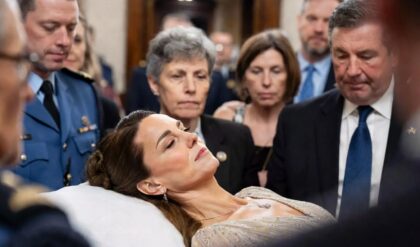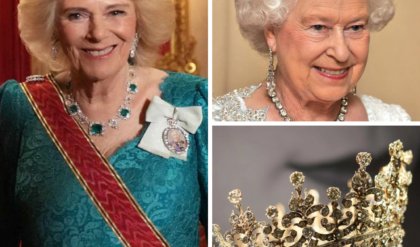The intergalactic prequel adventure debuts November 17th on HBO
Spectacle, Sisterhood, and Secrets Abound in Dune: Prophecy: Review
The intergalactic prequel adventure debuts November 17th on HBO

The Pitch: Set 10,000 years before the advent of Paul Atreides and the events depicted in the Dune film franchise, Dune: Prophecy takes us back to the beginning — almost. The new HBO sci-fi show, set to premiere on Sunday, November 17th, focuses on Valya Harkonnen (Emily Watson), the Mother Superior of the rising Bene Gesserit, the mysterious, powerful sisterhood that manages an empire from the shadows.
Sister Sister: The lore of Dune is extensive and can be quite confusing for those who haven’t dug into Frank Herbert’s books (and still confusing for some of those who have done so); Dune: Prophecy is specifically based on the novel Sisterhood of Dune, which was co-written by Frank Herbert’s son, Brian, and Kevin J. Anderson. The story is set shortly after humanity has barely triumphed in a war over rebellious “thinking machines,” and Harkonnen isn’t the only surname fans of the Denis Villeneuve films might recognize — the Harkonnens were betrayed by the Atreides clan in the final days of the war, painted as deserters and cowards, and sentenced to exist on a desolate, frozen planet in the society that emerges.
That’s where Valya and Tula Harkonnen (Olivia Williams) come into play. The two sisters are allied by blood, but have divided goals when it comes to their path forward: Valya is driven by rage and a desire for revenge against the Atreides, while Tula is a more patient figure within their growing order, dedicated to the young acolytes training on the planet of Wallach IX.

Dune: Prophecy (HBO)
But it’s Valya who has somewhat ruthlessly risen to a leadership role, serving the Emperor (Mark Strong) as he navigates an alliance-via-marriage for his daughter, sisterhood hopeful Nez (Sarah-Sofie Boussnina), while managing spice harvesting from afar with his wife (Jodhi May) and charming son, Prince Constantine (Josh Hueston). But when a mysterious member of the Emperor’s military arrives with talk of the divine on Arrakis and disrupts the flow, Valya and her followers are called to intervene.
Our Plans Are Measured in Centuries: Now, that might sound like a lot of exposition, and that’s because it is. The good news for anyone who might feel overwhelmed by the number of characters in play will probably be relieved to know that Dune: Prophecy is remarkably visually engaging, with the warring houses delivering an energy reminiscent of a show like Game of Thrones. The enormous ensemble cast is electric, and once the narrative overcomes the challenge of establishing the immense number of names, titles, rules, and motivations involved, the series quickly hits its stride.

Dune: Prophecy (HBO)
10,000 years is a long time — this writer, at first, found herself a bit distracted by the idea that the dominant houses and family names would not change over the course of 100 long centuries. It’s a bit hard to believe… Until we remember that this is exactly the purpose of the group that will eventually be known as the Bene Gesserit, who control bloodlines, plan out lineages, and set plans in motion as far in advance as they can.
Let the Spice Flow: Overall, the strength of the ensemble is one of the most enticing aspects of Dune: Prophecy, and there’s not a weak link among them. There’s considerable force to the younger counterparts of the Harkonnen sisters, as portrayed by Jessica Barden and Emma Canning, while Chris Mason confidently lays the groundwork for the Atreides line as a clever sword master named Keiran.
The training ground of the acolytes offers one of the richest environments in the show, and, overall, it’s a joy to be in this world but have the story be driven almost entirely by women. One standout from the younger generation of Sisters is Chloe Lea as Lila, a particularly gifted trainee whose power becomes especially important to the Sisterhood’s future.

Dune: Prophecy (HBO)
These episodes are lengthy and detail-rich, and most of the time that doesn’t feel like a hindrance. Four of the six episodes of the season were provided to critics, and the tension consistently increases throughout. Motives are revealed with care; duplicitous figures are unmasked. The story isn’t quite told linearly, with Episode 3 enmeshing itself in the youths of the Harkonnen sisters — while the seeds of the Harkonnens’ eventual, outright villainous nature are visible, it’s not unlike the sympathy afforded to a figure like Anakin Skywalker in the prequel films of another space saga.
The Verdict: Even if very few creatives can offer visuals like Denis Villeneuve can, fans of the recent film installations will enjoy the sweeping world-building and detailed, impeccably designed set pieces here in Dune: Prophecy. Additionally, fans of the books are likely to be satisfied with the approach to source material that remains notoriously difficult to adapt.
Then, there’s the demographic who hasn’t seen the movies and couldn’t be made to care about the books but just loves a grand sci-fi epic, and that’s the group of people I’d be most excited to see give the show a try. Filmed throughout Hungary and Jordan, Dune: Prophecy makes great use of sweeping locales, offering a refreshing reprieve from CGI-heavy programs that don’t ever quite feel authentic. Here, things feel real, from the stakes to the warm-lit halls and even the mysterious power of the Sisterhood. Buckle up, folks — we’re going back to the stars.
Where to Watch: Dune: Prophecy premieres on HBO and Max on November 19th. Get started on Max here.
Trailer:





